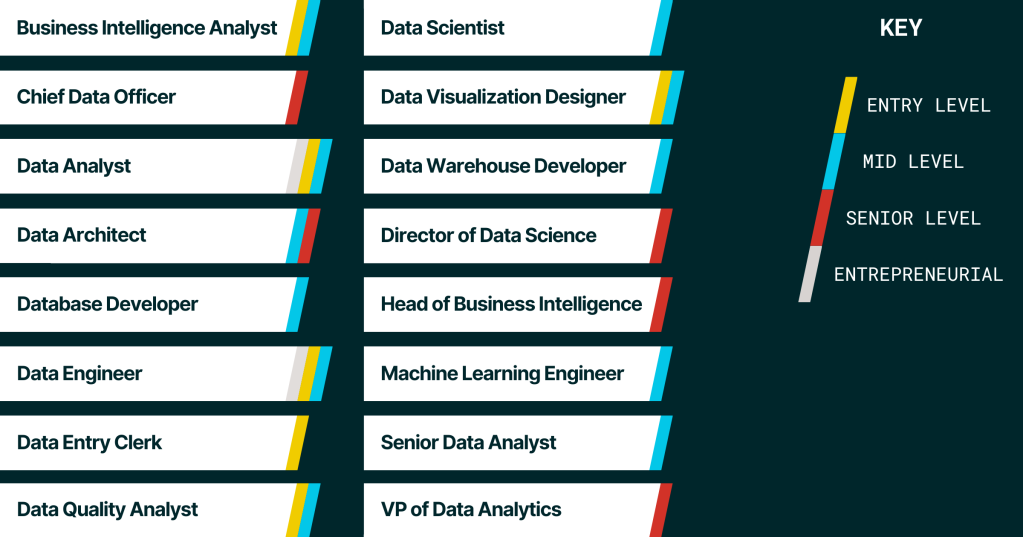Data professionals take numbers and turn them into stories. They indicate where data inspires action, which is something that all departments, companies, and industries can benefit from. If you like to collect, clean, visualize, or analyze data, then this industry may be for you.
Not convinced yet? Here are a couple data points to give you an idea of what the industry has to offer and where it’s heading.

Let’s review this skill set together by discussing how data expertise can be acquired, applied, and transformed into a fulfilling career.
What can I do with data skills?
As the name implies, data professionals work with data. However, there are a lot of tasks involved with data collection and interpretation — and many areas that you can specialize in within the industry. Here are four common responsibilities in data:
Manage data
- Collect, organize, and clean large datasets.
- Ensure data quality and accuracy through ongoing monitoring, and testing.
Build data systems
- Develop and maintain databases, data models, and reporting systems.
- Develop statistical and machine learning models to analyze complex datasets and generate predictive insights.
- Develop data pipelines to automate data processing and analysis.
Analyze data
- Analyze and interpret data to identify patterns, trends, and insights that can inform decisions.
Present data and propose solutions
- Create visualizations to present data and analysis results to stakeholders.
- Collaborate with stakeholders to define business problems and develop solutions using data-driven approaches.
- Communicate insights to both technical and non-technical stakeholders.
To know where your skill set fits within the industry, sometimes all it takes is a little research. Listen as Data Engineer Ryan Schraeder shares his experiences in the industry and how he got there:

I’m Ryan Schrader and I am a prior boot camp graduate in the University of Denver’s Data Analytics Boot Camp.
I have prior background in the music business and recording arts, and have a degree in the music business and audio production from CU down in Denver. I transitioned to data through the boot camp and, since then, I’ve been an analyst and segued myself more into data engineering. Currently, I am a data engineer in the Dish Network phase for all of the television scheduled programming.
Discover your career opportunities
As the data industry continues to grow, so does the range of career opportunities and job titles.

Let’s chat about three job titles that often get confused: Data Analyst, Data Scientist, and Data Engineer.
Data Analyst — Collects and organizes large datasets, and analyzes data to find patterns, trends, and insights. Essential skills include SQL, data visualization, Python, and data analysis.
Data Scientist — Designs and builds predictive models that optimize decision-making and produce insights. Essential skills include machine learning, statistical methods, Python, and SQL.
Data Engineer — Builds and maintains the infrastructure (data pipelines, databases, etc.) that enables data analysis and processing. Essential skills include database administration, cloud computing, and software development.
Now that you know the roles that exist within the data industry, you can start researching roles that may be a good fit for you.
Expert advice
“Utilize LinkedIn to understand the diverse career opportunities that are available. The landscape is constantly changing so it’s important to stay up to date with the latest trends through growing your network and connecting with professionals in the field. Join organizations or groups where you can gain access to spaces where experts share their knowledge.”
— Donne Bailey, career expert at edX

How can I acquire data skills and turn them into a career?
If you’re interested in pursuing your own career in data, we recommend taking these steps:
Research is key when it comes to any career, and a career in data is certainly no exception. Take advantage of all the information that’s out there, whether it’s through surfing the internet for job titles, listening to industry-specific podcasts, or getting connected to professionals in the areas or positions that interest you.
Pro tip:
Explore your career’s possibilities. As part of your research, take every opportunity to learn more about topics in your desired field. Browse the edX course catalog at edx.org to see what data-related topics, courses, and programs interest you and start advancing your career in data today.
One key part of the research phase is networking. This simple step is often overlooked and undervalued, but can have a significant impact on your career trajectory. If you want to get clear on your career goals and aspirations, you must take time to talk with professionals about what the work actually looks like.
By reaching out to professionals in your targeted fields, positions, and companies, you open a door of opportunity in your own career. It is invaluable to connect with data professionals who could vouch for you and gain hard-to-find intel about the industry or organizations of interest.
Pro tip:
We highly recommend scheduling informational interviews (interviews for the purpose of learning and connecting) with data professionals and hiring managers as a way to gather information. These are people that can help you learn new skills, offer advice, and share job opportunities with you.
Check out our Networking Guide and Outreach Templates and Resources for help getting started.
To supplement your understanding of what others are doing professionally, make sure to get clear on your own goals and aspirations. Ask yourself if the data industry is what interests you, or if it’s just data functions within another industry. The possibilities are endless.
Data professionals are highly valued by employers when they have a blend of in-demand technical skills, or hard skills, and other desirable personal traits, or soft skills. Make sure to specialize in one or more of the technical skills or languages listed below to prove your expertise in the field, while also taking any opportunity to grow and flex those soft skills that employers look for in well-rounded data candidates.
In-demand technical skills
- SQL
- Python
- Data visualization tools (Examples: Tableau and Power BI)
- Machine Learning
- Big data technology
- Cloud computing
In-demand soft skills
- Communication: Make complex topics understandable.
- Problem-solving: Navigate and utilize complex datasets.
- Attention to detail: Create systems and analyses that are accurate and reliable.
- Ethics: Ensure that work is aligned with ethical standards on data privacy, bias, and fairness.
Note that it is not necessary for you to acquire all of these skills. The skills that are best suited for you are the skills that align with the work that you want to accomplish.
There are a variety of mediums through which you can learn data skills. Consider which route best fits your needs and learning-style. Here are a few options to consider:
Self-education — If you are looking to learn asynchronously, informally, or casually, self-education is a great place to start. There are many approaches to this style of learning that support various career goals, budgets, learning styles, and time commitments. Here are some ways to self-educate:
- Informal opportunities: Gain a greater understanding of the industry by reading. Explore books, articles, and even research papers to expand your data knowledge and learn what’s happened or is happening in the field. Not a reader? There are plenty of videos, podcasts, and other forms of multimedia that can teach you a thing or two about careers or work related to data.
- Online Courses: If you prefer a more structured or socialized learning experience, online courses might be well-suited. edX.org offers several instructor-led and self-paced data courses that may be of interest.
- Professional certifications: When you want a less casual learning experience, but don’t have needs that warrant a boot camp or degree, professional certifications may be the best fit for you. Professional certifications are a great addition to your resume and prove your technical skills for roles in data. edX.org offers many certificate programs within the field of data that may interest you.
Boot camps — These innovative programs are designed by experienced curriculum teams to help you achieve your career goals in a fraction of the time it takes to complete a traditional degree. With many boot camps lasting just 3-12 months, you’ll be amazed at how quickly you can gain the knowledge and expertise you need to launch your dream career. Explore popular data boot camps on edX.org.
Degree programs — A degree is an excellent choice if you want to gain a comprehensive understanding of the rich history, intricate theories, mathematical concepts, and cutting-edge innovations that have contributed to shaping the data industry that we know today. A degree can be especially helpful if you are pursuing roles that are mid-level or senior level, such as Data Engineer or Data Architect. Popular degree programs among data professionals are computer science, statistics, and data science.
The technical hiring process is different from those of non-technical fields in two ways:
First, many employers require a portfolio of projects, such as course projects, personal projects, and professional projects. You’ll want to build a competitive online portfolio that highlights your skills and unique value.
Second, many technical hiring processes involve a technical screening. This is a stage in the interview process where the employer assesses a candidate’s technical skills. They might sound intimidating at first, but remember that the employer wants you to succeed. They are hoping to find a great candidate and that candidate could be you.
Helpful resources:
The career team at edX has resources and workshops to help you fine-tune your application materials and prepare for technical interviews. Start with our Technical Screening Guide.
Once you get your foot in the door of the industry, make sure to celebrate your success. The career journey is full of ups-and-downs and we believe that every victory deserves acknowledgement.
With that said, your journey doesn’t end here — it’s only just beginning. Give yourself grace and understand that careers are not linear. Here are some of the ways that you could continue growing within the data industry:
Continued learning — Always make sure to reference our course catalog on edX.org for continued learning opportunities. Now that you’ve secured a career in data, it never hurts to brush up on your skills, expand your knowledge within the industry, or learn about other subject matters that apply to your work, interests, or something in between.
Promotions — There are many opportunities to advance in the data industry. In general, earning a promotion involves building your expertise in data technologies, team management, project management, and decision-making.
Promotions in data:
Here are a few senior roles that you may want to work towards as you advance your career in data:
Chief data officer: Responsible for managing an organization’s data strategy and working with leaders to identify opportunities to utilize data.
Principal data scientist: Responsible for the development of advanced data models and leading data science projects.
Head of business intelligence: Responsible for developing and implementing an organization’s business intelligence strategy and working with leaders to inform business decisions.
Pivots — Make sure to regularly check in with yourself and your satisfaction with daily tasks. If you find yourself disinterested in your current role, take stock of the things you like and dislike about it, keep your eyes out for company-sponsored growth opportunities, and pursue career pivots that optimize your background, skill set, and interests.
What could my career look like with a data skill set?
It is difficult to say exactly what your life would look like as a data professional, but we do have some metrics about the realities of the industry. Consider how these may factor into your life plan:
Remote work opportunities — Cloud computing technologies are popular in the data industry, which make it possible for data professionals to work remotely. If you are looking for remote work, it is likely that you can find opportunities in the data field.
Competitive salaries — Data professionals are in demand and their salaries reflect this. Check it out for yourself by researching the salaries of data professionals in your region.
Tech-focused work — Data professionals work with tech everyday, and today it seems that most are working with Python. According to the Anaconda Data Science Report (2022), 85% of data professionals work with Python at their current employer. It is highly likely that you will work with Python in your data career in addition to other technologies.
Expert advice
“During my data science role, I realized that I am most passionate about the communication and project roadmap side of being on a tech team. So I started as a data scientist and now I manage a data science and analytics team. This current role is a really good fit. You’ll find what works for you.”
— Jordan Hall, data science & analytics manager

What are my next steps?
Learn about topics in data:
Register for a course on edX to learn about a variety of topics within the data industry such as Intro to Data Science and Python for Data Science.
Watch a session:
Watch a relevant session on our Events page to learn more about the industry and other professionals’ experiences within it.










